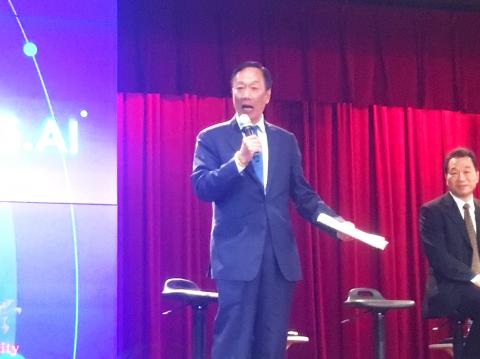Hon Hai Precision Industry Co (鴻海精密) yesterday announced that it might spend NT$10 billion (US$342 million) over the next five years on artificial intelligence (AI) talent cultivation and technology development in Taiwan, in a bid to localize the development of AI applications in its industrial Internet-focused operations.
“[NT]$10 billion is the minimum investment in Taiwan. I am willing to spend US$10 billion here if it is what it takes to grow more AI applications in ‘smart’ manufacturing locally,” company chairman Terry Gou (郭台銘) told a news conference at the company’s headquarters in New Taipei City’s Tucheng District (土城).
Hundreds of the company’s employees also attended the announcement.

Photo: Chen Jou-chen, Taipei Times
Gou said Hon Hai would financially support its employees to go abroad and pursue advanced studies in the field of AI.
“Take your family to MIT [the Massachusetts Institute of Technology] or the University of Tokyo. We will fully support your expenses,” he said.
Hon Hai is to open its manufacturing bases around the world to Taiwanese academics, start-ups and individuals to experiment with their AI applications and jointly explore the possibility of AI uses in the industrial Internet era, Gou said.
“I am calling on talent in Taiwan: Hon Hai can be a place where you can develop AI technologies,” Gou said.
Company executive vice president Lu Fang-ming (呂芳銘) said Hon Hai has been collecting a wide range of data from its manufacturing bases around the world for more than five years, which includes data on product design, supply chains, production and logistics.
The company has used the critical data and cloud-computing infrastructure, as well as developed AI solutions, to increase its production efficiency, with five plants that run around the clock without lights launched in China last year, Lu said.
Hon Hai plans to recruit at least 100 AI talents in Taiwan in the first phase of its project to push efforts in industrial Internet-driven technologies, Lu said.
The company is to set up industrial Internet-focused AI labs in Taipei and Kaohsiung, and then expand to Shenzhen, Shanghai, Nanjing and Beijing in China, he said.
The company also plans to establish AI labs in Japan and the US, he added.
The company has more than 10 high-performance computing (HPC) facilities in several cities worldwide, including Kaohsiung, Tokyo, Osaka, Japan, and Prague, as well as Wisconsin and San Diego in the US, Gou said.
The firm’s global HPC network is to be a key platform to connect and share industrial data and AI solutions, which the company would open to small and medium-sized enterprises, Gou said.

AIR DEFENSE: The Norwegian missile system has proved highly effective in Ukraine in its war against Russia, and the US has recommended it for Taiwan, an expert said The Norwegian Advanced Surface-to-Air Missile Systems (NASAMS) Taiwan ordered from the US would be installed in strategically important positions in Taipei and New Taipei City to guard the region, the Ministry of National Defense said in statement yesterday. The air defense system would be deployed in Taipei’s Songshan District (松山) and New Taipei City’s Tamsui District (淡水), the ministry said, adding that the systems could be delivered as soon as the end of this year. The US Defense Security Cooperation Agency has previously said that three NASAMS would be sold to Taiwan. The weapons are part of the 17th US arms sale to

INSURRECTION: The NSB said it found evidence the CCP was seeking snipers in Taiwan to target members of the military and foreign organizations in the event of an invasion The number of Chinese spies prosecuted in Taiwan has grown threefold over a four-year period, the National Security Bureau (NSB) said in a report released yesterday. In 2021 and 2022, 16 and 10 spies were prosecuted respectively, but that number grew to 64 last year, it said, adding that the Chinese Communist Party (CCP) was working with gangs in Taiwan to develop a network of armed spies. Spies in Taiwan have on behalf of the CCP used a variety of channels and methods to infiltrate all sectors of the country, and recruited Taiwanese to cooperate in developing organizations and obtaining sensitive information

BREAKTHROUGH: The US is making chips on par in yield and quality with Taiwan, despite people saying that it could not happen, the official said Taiwan Semiconductor Manufacturing Co (TSMC, 台積電) has begun producing advanced 4-nanometer (nm) chips for US customers in Arizona, US Secretary of Commerce Gina Raimondo said, a milestone in the semiconductor efforts of the administration of US President Joe Biden. In November last year, the commerce department finalized a US$6.6 billion grant to TSMC’s US unit for semiconductor production in Phoenix, Arizona. “For the first time ever in our country’s history, we are making leading edge 4-nanometer chips on American soil, American workers — on par in yield and quality with Taiwan,” Raimondo said, adding that production had begun in recent

Seven hundred and sixty-four foreigners were arrested last year for acting as money mules for criminals, with many entering Taiwan on a tourist visa for all-expenses-paid trips, the Criminal Investigation Bureau (CIB) said on Saturday. Although from Jan. 1 to Dec. 26 last year, 26,478 people were arrested for working as money mules, the bureau said it was particularly concerned about those entering the country as tourists or migrant workers who help criminals and scammers pick up or transfer illegally obtained money. In a report, officials divided the money mules into two groups, the first of which are foreigners, mainly from Malaysia